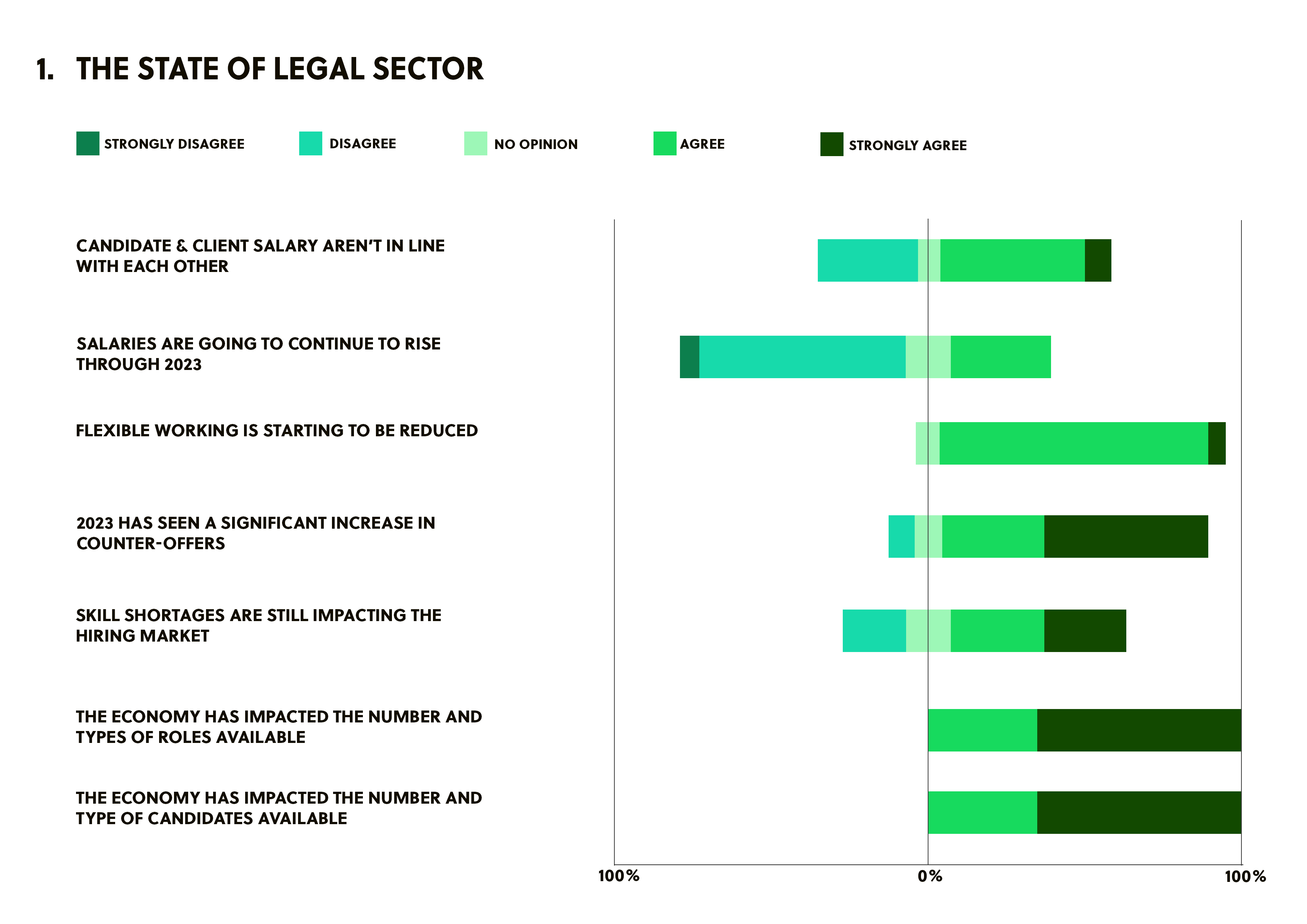To get a clearer picture of the current lie of the land within the Legal sector, we asked our consultants to rank the factors that have had the greatest impact on hiring within their industry, and to share their personal insights on the current hiring climate within the sector, their experiences operating within it over the first quarter and their predictions for the months that lie ahead.
Introduction
Due to the economic changes in recent months, we are seeing an increase in the number of offers that candidates are attracting, and in turn, salaries are continuing to rise.
Across the majority of regions and specialist practice areas, we have seen a number of common themes in the first quarter of 2023 that are continuing to make their presence known into the year. Namely, the prevalence of counteroffers turning candidates’ heads: in an uncertain economic climate, individuals will always be drawn to stability and security, hence why counteroffers are proving to be more successful than in previous years. Salary is equally a crucial driving factor, but some of our consultants are beginning to notice early signs of salary stagnation.
Where in the previous few years flexibility and remote working were key motivators for making a move within the sector, as the onset of the pandemic both highlighted and heightened the desire for work-life balance within the legal workforce, we are now beginning to see firms decrease their flexible and hybrid offerings, and begin to mandate returns to the office.
With all of this being said, however, the first quarter of the year provided clarity on one point: fears of recession have loomed over firms for some time, but it has become evident that the country is no longer predicted to go into a recession. Hopefully, we can now expect increased confidence in the market as the year progresses, for both businesses and those individuals within the sector who may be looking for a change.

“Law firms in the City of London remain very busy and are definitely hiring; but only where there is a strategic and/or growth need, or by way of making a replacement…”
Very little is happening speculatively. Moreover, the majority of candidates are not looking to make a move, which means that the roles that are available are much harder to fill. Clients are reporting that across their agents in the city, it is proving to be a much harder market than usual; and it is not an easy market normally.
Those individuals who are not looking to make a move can be accounted for by the fact that they are likely waiting on imminent salary reviews, news on a promotion, or yearly bonuses. We could therefore see many of these candidates come onto the market in Q2 or Q3 once they know their position in their current firm, have received their large yearly bonus, and are therefore freed up to leave.
In my experience, salary competition is beginning to slow down and however counter offers still are still prevalent.
“The demand for more senior hires far outweighs the number of candidates that are available, thus creating a larger gap between salary expectations for candidates and clients…”
Individuals within the sector are still looking for inflated salaries, as their skillsets are in high demand, however firms are struggling to keep up with how competitive salaries have become.”
“The first quarter of the year has been marked by a feeling of caution, which is being displayed by both employers and candidates…”
Opportunism has noticeably dropped, and the market has returned to one where planned and strategic hires fulfill a much higher percentage of total hires.
“As of this year, many firms are now seeking 3-5 PQE Solicitors…”
The pattern I have seen is many people in 2018-2020 qualified into property due to how buoyant the conveyancing market was, leading to many SME’s only providing NQ positions in Property at the time. As a result there is now a shortage of ‘junior qualified’ Solicitors within other practice areas, which when coupled with a drop in the property market has lead to an influx of Solicitors looking to retrain into new areas.
“With the economy having an uncertain feeling in the first quarter of this year, candidates have been cautious to change jobs; but, we are finding many are reaching out to discuss career planning and looking at future steps…”
Job security is going to become a huge deciding factor, as talks of redundancies are becoming more frequent. Particularly in practice areas such as Residential Property, where the work is so dependent on the state of the economy, candidates are scared of a “last in first out” mentality.
Flexibility is starting to be increasingly reduced with firms changing their policy on the number of days in the office (most commonly, moving from a 2-day office week to a 3-day office week). This obviously in turn impacts people’s ability to accept positions when they live slightly further away due to the travel required. One of the biggest challenges in the Southeast region is the pull to work in London when living in areas like Surrey, Kent, or Hertfordshire, as the commute is quick and there is generally more flexibility and a huge increase in salaries. With regards to salaries, I think salaries will start to even out to be more realistic than they were in the last year.